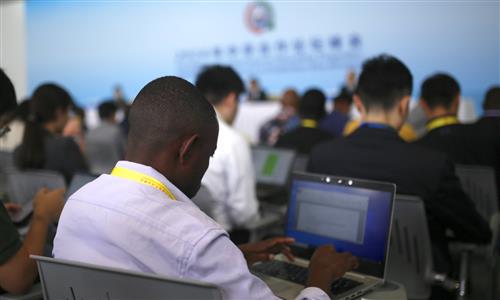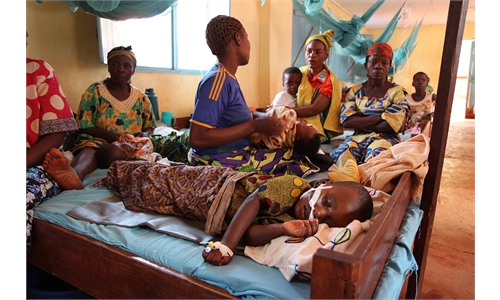IN-DEPTH / IN-DEPTH
Young Chinese entrepreneurs explore opportunities in Africa amid strengthened bilateral cooperation
Vision for the future
Editor's Note:
The 2024 Forum on China-Africa Cooperation (FOCAC) Summit is being held in Beijing from September 4 to 6. The theme of this year's summit is "Joining Hands to Advance Modernization and Build a High-Level China-Africa Community with a Shared Future." In light of this key event, the Global Times launches a series of China-Africa stories, including interviews with political leaders, stories of exchanges between young people from China and African countries, and intensive cooperation in various fields. Through these stories, we will see how China and Africa are deepening their ties and building a brighter future together.
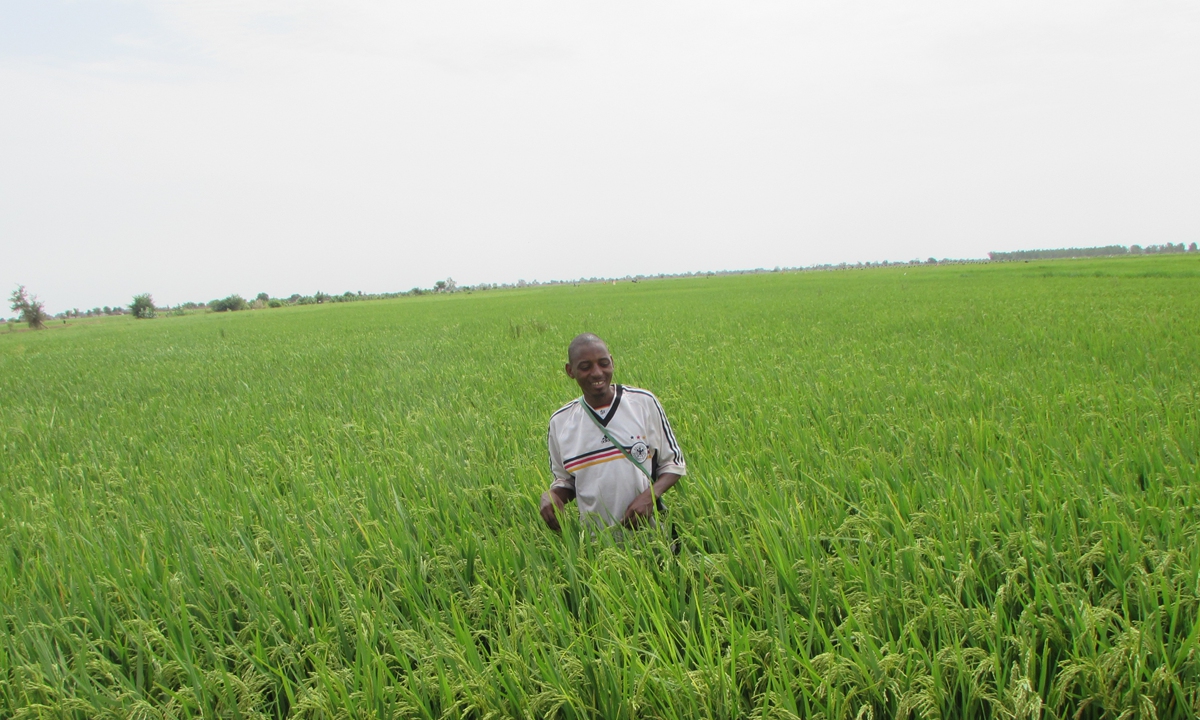
The English adventure novel Robinson Crusoe, published in 1719, tells the story of a young man who gave up the conventional comforts of a middle-class life and embarked on a sea voyage to seek adventure.
Fast forward three centuries, Millennial Chinese national Cao Fengze, having graduated with a doctorate from China's prestigious Tsinghua University, is following in Crusoe's footsteps by leaving behind his secure career in China to pursue opportunities in Africa.
As he has worked on infrastructure projects in countries like Tanzania, Zambia, South Africa and Lesotho under the framework of the China-proposed Belt and Road Initiative (BRI), Cao's endeavors sparked heated discussion online and inspired a new generation of young Chinese to consider Africa as a promising destination for realizing their own aspirations.
These ambitious individuals recognize that conventional overseas destinations like Europe and the US are no longer the sole gateways to success in today's evolving global landscape. Africa, with its dynamic opportunities and potential, has emerged as a beacon for those seeking new horizons.
By venturing into Africa, these forward-thinking youth are not only forging their own paths but also helping pave the way for the development of both China and other developing countries.
This journey is made possible through the deepening collaboration and strong bonds between China and Africa on the global stage, as well as Africa's increasingly prominent presence in China's social media landscape. Together, these interconnected elements form a network of young individuals transcending the confines of the traditional capitalist order, fostering a "community of shared future for mankind."
Across social media posts sharing people's experiences working in Africa, there's a prevailing belief among these young go-getters that "If you can tough it out, Africa is a goldmine waiting to be tapped." In those posts, Africa is no longer a synonym for poverty and underdevelopment, but is a continent seen as a land of opportunity and growth. With Chinese goods gaining popularity in Africa, young entrepreneurs are seizing the chance to make their own marks in sectors like e-commerce.

Empowering small African traders
The active trade between China and Africa has created job opportunities for numerous foreign trade distributors. Among them, 24-year-old Fang Jing stands out for her focus on the emerging small wholesalers and African women running small businesses in this field, rather than the traditional large foreign trade clients.
Fang, the manager of trading company AKOMAPA, facilitates the direct sale and marketing of Chinese goods from factories to small-scale African wholesalers, with products ranging from diapers and mops to factory equipment.
With a turnover exceeding 10 million yuan ($1.4 million) in the past 12 months, Fang's company not only supplies goods but also offers free training to her African customers on selling products using a Chinese e-commerce mind-set.
For these emerging African small wholesalers and women looking to start their own businesses, finding the sources of authentic "Made in China" products. They face obstacles such as making sparse orders, language barriers, a lack of resources for on-site field research, difficulty in navigating online platforms, and troublesome after-sales services.
Fang told the Global Times that she addresses these needs by leveraging social media, where her vlogs showcase Chinese factories and product instructions, garnering significant interests from over 1,300 African retailers.
Fang's engaging videos, featuring the production process of items like diapers and slippers, resonate with African audiences via her down-to-earth personality and lively presentation style.
Her approach, inspired by Chinese e-commerce practices, intrigues many small-scale African retailers seeking to enhance their business strategies. Fang also provides online training on creating compelling product videos with a mobile phone and building customer groups for increased exposure and user engagement.
After quitting the high-paying and demanding IT industry and venturing into the uncharted territory of foreign trade with the Africans, Fang embarked on an adventurous journey two years after her college graduation.
She tirelessly braved the scorching sun to conduct surveys and investigations in various locations, seeking the ideal factory processing line that can manufacture products tailored to the daily habits and aesthetic tastes of African households. She fearlessly pursued debts across the ocean, risking bankruptcy, and burned the midnight oil scrolling through TikTok to grasp the consumption habits and cultural nuances of users in different African regions.
Witnessing the impact of her products, such as writing boards being used in African classrooms, Fang is filled with pride and satisfaction. She views herself as a mutually beneficial partner to her African customers.
In a shifting landscape where traditional manufacturing industries face pressure, young entrepreneurs like Fang are exploring new opportunities in Africa, attracting Chinese factories seeking to expand their presence in the African market. Fang's efforts have enabled her to ship an average of seven 40-foot containers overseas every month only one year after starting her business, showcasing the growing capabilities and confidence of Chinese youth in engaging with Africa.
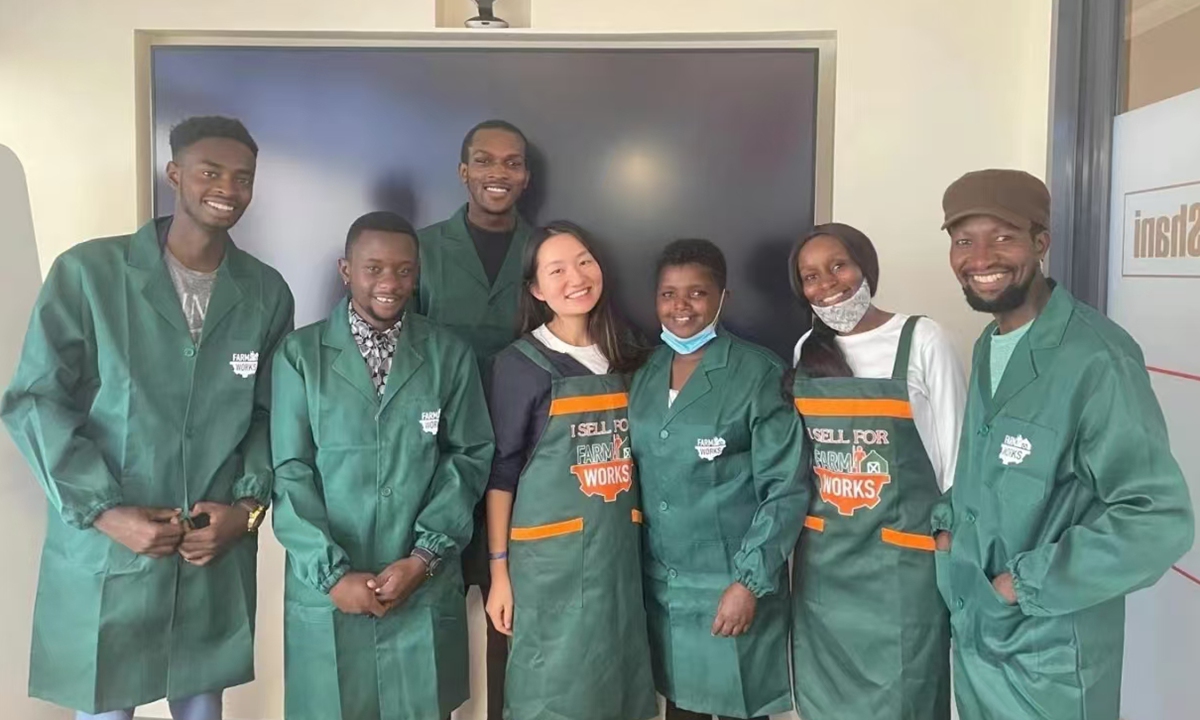
Strengthening small-scale farmers
Before venturing into Kenya to engage in farming and vegetable sales, 30-year-old Li Yi held a prestigious position as a consultant at McKinsey. Working in the firm's Los Angeles office at the time, creating presentations, and catering to clients from diverse industries, she did not even envision that within a few years, she would own a thousand-acre farm nestled at the foot of a mountain in Kenya, waking up at three in the morning to escort trucks to the market in the largest slum in Africa to sell tomatoes.
By the end of 2020, Li and her Kenyan partner had established an agricultural company named "FarmWorks," which primarily utilizes advanced planting techniques to empower local small-scale farmers. Li's company provides seeds, fertilizers, and standardized services such as spraying, while also handling backend crop procurement and sales to guarantee sales for farmers. They address the issues of "what to plant, how to plant it, and who to sell it to" for local small-scale farmers.
"Kenya's agricultural sector may have a modest starting point, but it boasts immense potential and a high ceiling," Li told the Global Times about her entrepreneurial journey.
"The African country struggles with low yields per acre, a scarcity of skilled labor, and limited local operational capabilities," she said. "Nevertheless, rapid population growth in Africa, land degradation due to climate change, and heavy reliance on imported staple foods have created a strong demand for agricultural advancements, particularly in high-yield, cost-effective farming utilizing superior seeds, fertilizers, and technology."
Embarking on a business venture in Africa is no easy feat. Issues such as imperfect social governance and law enforcement in Nairobi, along with incidents of theft by acquaintances and occasional demands for bribes from police and urban management officers are common occurrences.
Nonetheless, Li views starting a business in this enchanting African country as an exciting adventure, offering the opportunity to explore endless possibilities.
"For instance, in 2023, our farm collaborated with the International Potato Center to establish Africa's first solar-powered sweet potato storage facility, utilizing solar energy and a water circulation system for power generation. This innovative storage method enhances the quality of sweet potatoes," Li said, adding that this sustainable development experiment intriguing.
"From a purely financial standpoint, Africa may not yield immediate or substantial profits. For me, the satisfaction of tackling new challenges and making tangible impacts on local livelihoods is immensely rewarding. I believe this is invaluable," she noted.
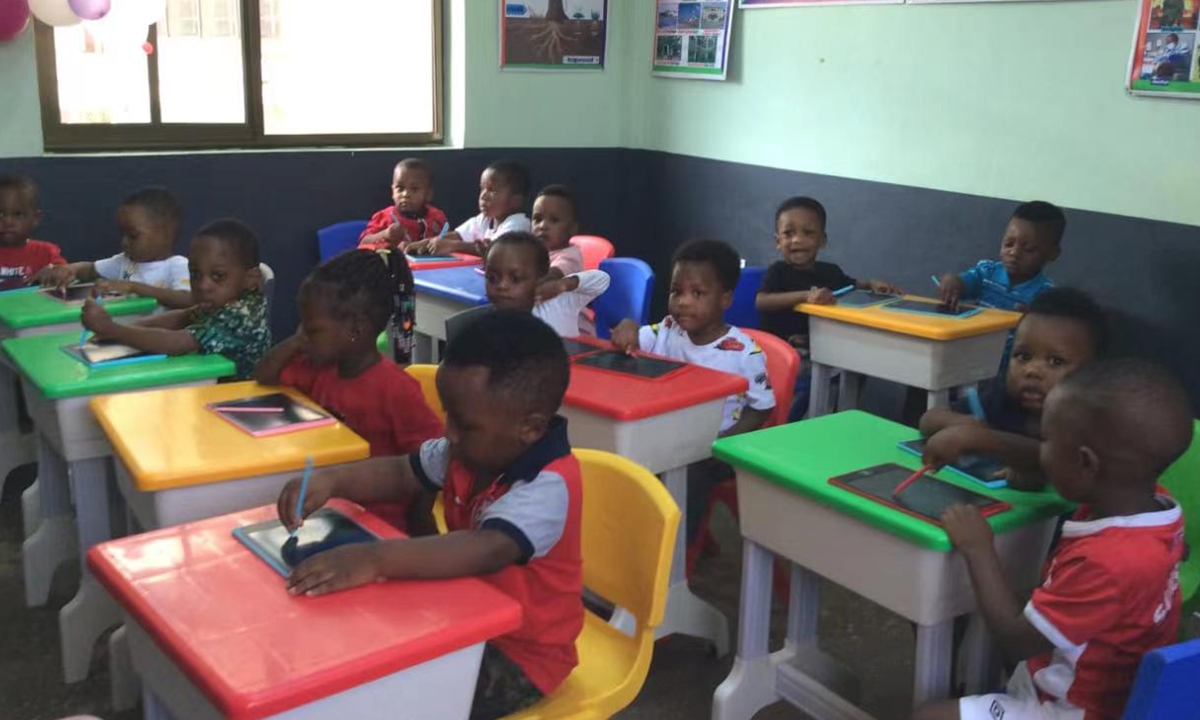
Risky but enthusiastic
Hu Zhenxing, from Central China's Henan Province, became an internet sensation in October 2023 after a video, which showed him speaking English with a strong "Henan accent" in a meeting with a dozen employees in Africa, went viral.
Over the last 10 years, the scale of the hair products company Hu works for has gradually grown, and the wigs his company produced have sold well in the African market, while providing many jobs for the local people.
At present, the company's Ghana factory employs more than 1,200 people. Hu also graduated from the initial workshop director to the head of the Ghana plant. His career path is also a microcosm of Henan's export-oriented enterprises exploring opportunities in Africa.
Many find that working in Africa offers a less stressful and more fulfilling lifestyle, with opportunities to align their careers with local development goals. With the ongoing implementation of cooperation initiatives within the bilateral mechanism framework between China and Africa aimed at boosting youth exchanges, promoting import and export trade, and advancing China's assistance in agriculture, industry, and talent development in Africa, young people in China are eagerly seeking opportunities to pursue their dreams in the growing dynamic interaction of bilateral relations.
With the right mind-set and determination, these young entrepreneurs are carving out a niche for themselves in Africa's booming economy, actively engaging with the continent's macroeconomic development strategies and making their mark in the vibrant African business landscape.
While the allure of Africa's development potential is strong, venturing into unfamiliar territories do come with risks.
One of the biggest risks is the unfamiliarity with the local market and business environment. Cultural differences, language barriers, and a lack of understanding of local customs can make it difficult for Chinese entrepreneurs to navigate the African market.
Another major challenge is the lack of infrastructure in many African countries. Poor transportation networks, unreliable electricity supply, and limited access to internet and communication services can hinder the smooth operation of businesses. Chinese entrepreneurs may find it challenging to set up their operations and ensure efficient logistics in such environments. The danger of infectious disease is also part of the concern.
Moreover, political instability and corruption in some African countries pose significant risks to Chinese entrepreneurs. They may face challenges in dealing with government officials, obtaining necessary permits and licenses, and protecting their investments from potential expropriation or unfair treatment.
Even with great enthusiasm, several entrepreneurs who spoke with the Global Times still urge young Chinese people to carefully consider whether they are suitable to come to Africa for development after they have fully understood the situation. But they also welcome more people to join their ranks, as only by expanding can they jointly find opportunities within this emerging market in the process of the continent's modernization.
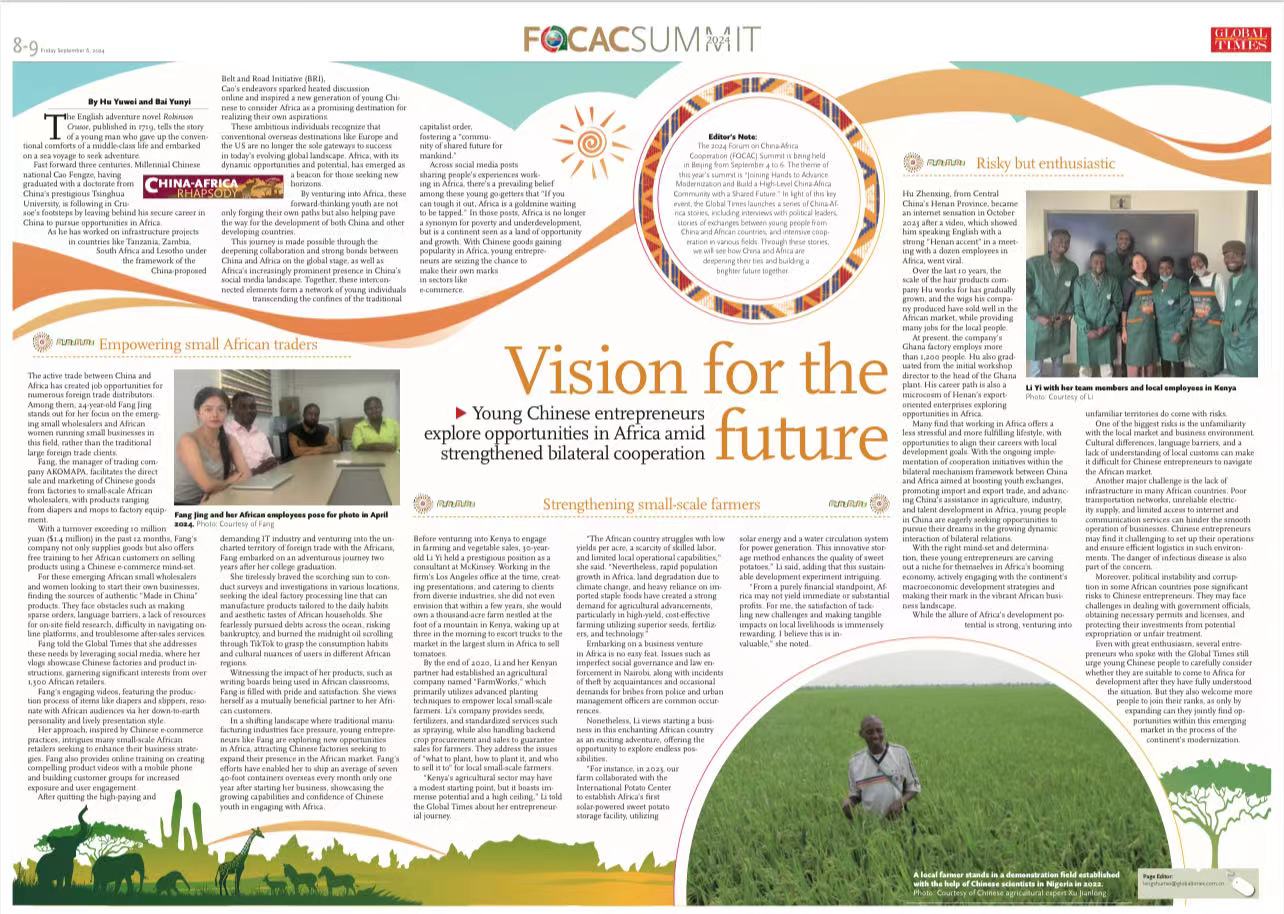
The 2024 Forum on China-Africa Cooperation (FOCAC) Summit is being held in Beijing from September 4 to 6. The theme of this year's summit is "Joining Hands to Advance Modernization and Build a High-Level China-Africa Community with a Shared Future." In light of this key event, the Global Times launches a series of China-Africa stories, including interviews with political leaders, stories of exchanges between young people from China and African countries, and intensive cooperation in various fields. Through these stories, we will see how China and Africa are deepening their ties and building a brighter future together.

A local farmer stands in a demonstration field established with the help of Chinese scientists in Nigeria in 2022. Photo: Courtesy of Chinese agricultural expert Xu Jianlong
The English adventure novel Robinson Crusoe, published in 1719, tells the story of a young man who gave up the conventional comforts of a middle-class life and embarked on a sea voyage to seek adventure.
Fast forward three centuries, Millennial Chinese national Cao Fengze, having graduated with a doctorate from China's prestigious Tsinghua University, is following in Crusoe's footsteps by leaving behind his secure career in China to pursue opportunities in Africa.
As he has worked on infrastructure projects in countries like Tanzania, Zambia, South Africa and Lesotho under the framework of the China-proposed Belt and Road Initiative (BRI), Cao's endeavors sparked heated discussion online and inspired a new generation of young Chinese to consider Africa as a promising destination for realizing their own aspirations.
These ambitious individuals recognize that conventional overseas destinations like Europe and the US are no longer the sole gateways to success in today's evolving global landscape. Africa, with its dynamic opportunities and potential, has emerged as a beacon for those seeking new horizons.
By venturing into Africa, these forward-thinking youth are not only forging their own paths but also helping pave the way for the development of both China and other developing countries.
This journey is made possible through the deepening collaboration and strong bonds between China and Africa on the global stage, as well as Africa's increasingly prominent presence in China's social media landscape. Together, these interconnected elements form a network of young individuals transcending the confines of the traditional capitalist order, fostering a "community of shared future for mankind."
Across social media posts sharing people's experiences working in Africa, there's a prevailing belief among these young go-getters that "If you can tough it out, Africa is a goldmine waiting to be tapped." In those posts, Africa is no longer a synonym for poverty and underdevelopment, but is a continent seen as a land of opportunity and growth. With Chinese goods gaining popularity in Africa, young entrepreneurs are seizing the chance to make their own marks in sectors like e-commerce.

Fang Jing and her African employees pose for photo in April 2024. Photo: Courtesy of Fang
Empowering small African traders
The active trade between China and Africa has created job opportunities for numerous foreign trade distributors. Among them, 24-year-old Fang Jing stands out for her focus on the emerging small wholesalers and African women running small businesses in this field, rather than the traditional large foreign trade clients.
Fang, the manager of trading company AKOMAPA, facilitates the direct sale and marketing of Chinese goods from factories to small-scale African wholesalers, with products ranging from diapers and mops to factory equipment.
With a turnover exceeding 10 million yuan ($1.4 million) in the past 12 months, Fang's company not only supplies goods but also offers free training to her African customers on selling products using a Chinese e-commerce mind-set.
For these emerging African small wholesalers and women looking to start their own businesses, finding the sources of authentic "Made in China" products. They face obstacles such as making sparse orders, language barriers, a lack of resources for on-site field research, difficulty in navigating online platforms, and troublesome after-sales services.
Fang told the Global Times that she addresses these needs by leveraging social media, where her vlogs showcase Chinese factories and product instructions, garnering significant interests from over 1,300 African retailers.
Fang's engaging videos, featuring the production process of items like diapers and slippers, resonate with African audiences via her down-to-earth personality and lively presentation style.
Her approach, inspired by Chinese e-commerce practices, intrigues many small-scale African retailers seeking to enhance their business strategies. Fang also provides online training on creating compelling product videos with a mobile phone and building customer groups for increased exposure and user engagement.
After quitting the high-paying and demanding IT industry and venturing into the uncharted territory of foreign trade with the Africans, Fang embarked on an adventurous journey two years after her college graduation.
She tirelessly braved the scorching sun to conduct surveys and investigations in various locations, seeking the ideal factory processing line that can manufacture products tailored to the daily habits and aesthetic tastes of African households. She fearlessly pursued debts across the ocean, risking bankruptcy, and burned the midnight oil scrolling through TikTok to grasp the consumption habits and cultural nuances of users in different African regions.
Witnessing the impact of her products, such as writing boards being used in African classrooms, Fang is filled with pride and satisfaction. She views herself as a mutually beneficial partner to her African customers.
In a shifting landscape where traditional manufacturing industries face pressure, young entrepreneurs like Fang are exploring new opportunities in Africa, attracting Chinese factories seeking to expand their presence in the African market. Fang's efforts have enabled her to ship an average of seven 40-foot containers overseas every month only one year after starting her business, showcasing the growing capabilities and confidence of Chinese youth in engaging with Africa.

Li Yi with her team members and local employees in Kenya Photo: Courtesy of Li
Strengthening small-scale farmers
Before venturing into Kenya to engage in farming and vegetable sales, 30-year-old Li Yi held a prestigious position as a consultant at McKinsey. Working in the firm's Los Angeles office at the time, creating presentations, and catering to clients from diverse industries, she did not even envision that within a few years, she would own a thousand-acre farm nestled at the foot of a mountain in Kenya, waking up at three in the morning to escort trucks to the market in the largest slum in Africa to sell tomatoes.
By the end of 2020, Li and her Kenyan partner had established an agricultural company named "FarmWorks," which primarily utilizes advanced planting techniques to empower local small-scale farmers. Li's company provides seeds, fertilizers, and standardized services such as spraying, while also handling backend crop procurement and sales to guarantee sales for farmers. They address the issues of "what to plant, how to plant it, and who to sell it to" for local small-scale farmers.
"Kenya's agricultural sector may have a modest starting point, but it boasts immense potential and a high ceiling," Li told the Global Times about her entrepreneurial journey.
"The African country struggles with low yields per acre, a scarcity of skilled labor, and limited local operational capabilities," she said. "Nevertheless, rapid population growth in Africa, land degradation due to climate change, and heavy reliance on imported staple foods have created a strong demand for agricultural advancements, particularly in high-yield, cost-effective farming utilizing superior seeds, fertilizers, and technology."
Embarking on a business venture in Africa is no easy feat. Issues such as imperfect social governance and law enforcement in Nairobi, along with incidents of theft by acquaintances and occasional demands for bribes from police and urban management officers are common occurrences.
Nonetheless, Li views starting a business in this enchanting African country as an exciting adventure, offering the opportunity to explore endless possibilities.
"For instance, in 2023, our farm collaborated with the International Potato Center to establish Africa's first solar-powered sweet potato storage facility, utilizing solar energy and a water circulation system for power generation. This innovative storage method enhances the quality of sweet potatoes," Li said, adding that this sustainable development experiment intriguing.
"From a purely financial standpoint, Africa may not yield immediate or substantial profits. For me, the satisfaction of tackling new challenges and making tangible impacts on local livelihoods is immensely rewarding. I believe this is invaluable," she noted.

Photo: Courtesy of Fang
Risky but enthusiastic
Hu Zhenxing, from Central China's Henan Province, became an internet sensation in October 2023 after a video, which showed him speaking English with a strong "Henan accent" in a meeting with a dozen employees in Africa, went viral.
Over the last 10 years, the scale of the hair products company Hu works for has gradually grown, and the wigs his company produced have sold well in the African market, while providing many jobs for the local people.
At present, the company's Ghana factory employs more than 1,200 people. Hu also graduated from the initial workshop director to the head of the Ghana plant. His career path is also a microcosm of Henan's export-oriented enterprises exploring opportunities in Africa.
Many find that working in Africa offers a less stressful and more fulfilling lifestyle, with opportunities to align their careers with local development goals. With the ongoing implementation of cooperation initiatives within the bilateral mechanism framework between China and Africa aimed at boosting youth exchanges, promoting import and export trade, and advancing China's assistance in agriculture, industry, and talent development in Africa, young people in China are eagerly seeking opportunities to pursue their dreams in the growing dynamic interaction of bilateral relations.
With the right mind-set and determination, these young entrepreneurs are carving out a niche for themselves in Africa's booming economy, actively engaging with the continent's macroeconomic development strategies and making their mark in the vibrant African business landscape.
While the allure of Africa's development potential is strong, venturing into unfamiliar territories do come with risks.
One of the biggest risks is the unfamiliarity with the local market and business environment. Cultural differences, language barriers, and a lack of understanding of local customs can make it difficult for Chinese entrepreneurs to navigate the African market.
Another major challenge is the lack of infrastructure in many African countries. Poor transportation networks, unreliable electricity supply, and limited access to internet and communication services can hinder the smooth operation of businesses. Chinese entrepreneurs may find it challenging to set up their operations and ensure efficient logistics in such environments. The danger of infectious disease is also part of the concern.
Moreover, political instability and corruption in some African countries pose significant risks to Chinese entrepreneurs. They may face challenges in dealing with government officials, obtaining necessary permits and licenses, and protecting their investments from potential expropriation or unfair treatment.
Even with great enthusiasm, several entrepreneurs who spoke with the Global Times still urge young Chinese people to carefully consider whether they are suitable to come to Africa for development after they have fully understood the situation. But they also welcome more people to join their ranks, as only by expanding can they jointly find opportunities within this emerging market in the process of the continent's modernization.

Vision for the future


